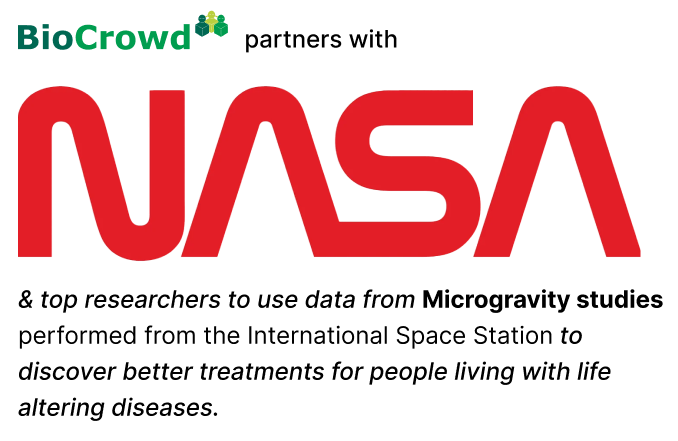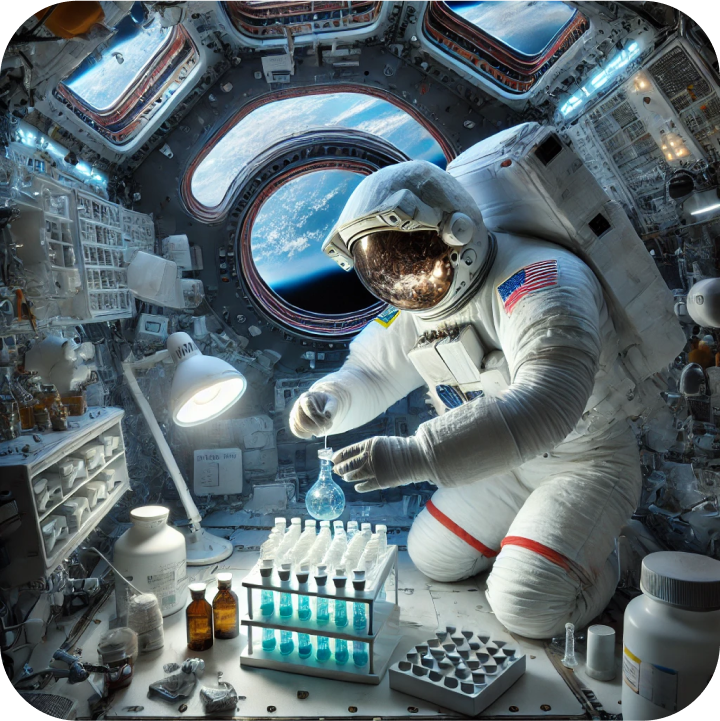
How Your Research or Investment Could Benefit from Microgravity
How Does BioCrowd’s Collaboration with NASA And the ISS Benefit Research?
Our collaboration with NASA and the International Space Station (ISS Labs) allows us to support innovative research on neurodegenerative diseases and other areas in microgravity environments. This unique setting can provide new insights into disease mechanisms and potential treatments that are not possible under Earth's gravity.

Why is Microgravity Relevant?
Microgravity is used as a research tool that helps study diseases at zero degrees. It allows scientists to evaluate hypotheses about cellular and molecular behavior without the confounding factor of gravity. This can lead to new understandings of how neurodegenerative processes work and how they might be countered. Research in microgravity can provide unique insights into the fundamental mechanisms of diseases, revealing new aspects leading to potential new therapeutic targets.

How Can We Work with BioCrowd to Participate in This Collaboration?
BioCrowd works with sponsors including biotech and pharma companies, investors, patient advocacy groups, foundations, family offices, and grant funding sources to support principal investigators (PI’s) leading research in the sponsored area via our marketplace platform.
In working with researchers, BioCrowd is introducing an accelerator business model for space research. Our role is to connect researchers and early startups working on translational research with scientific and industry experts, IP lawyers, corporations, and communities to grow and transform businesses and economies with funding, mentorship, in-kind support, and other benefits to help startups succeed.
The goals are to help scientific entrepreneurs find funding, improve their products or services, shorten time to market, improve patients’ outcomes and develop commercially successful products and services for licensing or acquisition.
Microgravity creates unique data sets. We are looking for investors to invest in translational research projects individually by disease target or in a pool. We also want to partner with patient advocacy groups and research institutions for this novel research to address their needs.

What Diseases can be Improved by Using Microgravity?
Microgravity and the unique environment of the International Space Station (ISS) offer valuable opportunities for studying and potentially improving various diseases. Here are some types of diseases and conditions that can be explored and potentially improved through research conducted in microgravity
- Musculoskeletal Diseases: Osteoporosis, Muscular Atrophy
- Cardiovascular Diseases: Atherosclerosis and Heart Disease, Hypertension
- Neurological Disorders: Parkinson's Disease, Stroke
- Immune System Disorders: Autoimmune Diseases, Infectious Diseases
- Cancer: Tumor Growth and Metastasis, Drug Testing
- Diabetes: Insulin Resistance
- Vision Disorders: Spaceflight-Associated Neuro-ocular Syndrome (SANS)
- Kidney and Urinary Tract Disorders: Kidney Stones, Urinary Tract Infections
- Respiratory Diseases: Asthma and COPD
